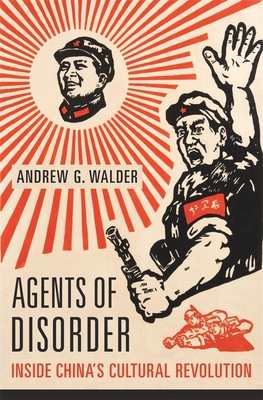

 Belknap Press
Belknap Press
Agents of Disorder: Inside China's Cultural Revolution


Key Metrics
- Andrew G Walder
- Belknap Press
- Hardcover
- 9780674238329
- 9.4 X 6.1 X 1.1 inches
- 1.32 pounds
- History > Asia - China
- English
 Secure Transaction
Secure TransactionBook Description
Why did the Chinese party state collapse so quickly after the onset of the Cultural Revolution? The award-winning author of China Under Mao offers a surprising answer that holds a powerful implicit warning for today's governments.
By May 1966, just seventeen years after its founding, the People's Republic of China had become one of the most powerfully centralized states in modern history. But that summer everything changed. Mao Zedong called for students to attack intellectuals and officials who allegedly lacked commitment to revolutionary principles. Rebels responded by toppling local governments across the country, ushering in nearly two years of conflict that in places came close to civil war and resulted in nearly 1.6 million dead.
How and why did the party state collapse so rapidly? Standard accounts depict a revolution instigated from the top down and escalated from the bottom up. In this pathbreaking reconsideration of the origins and trajectory of the Cultural Revolution, Andrew Walder offers a startling new conclusion: party cadres seized power from their superiors, setting off a chain reaction of violence, intensified by a mishandled army intervention. This inside-out dynamic explains how virulent factions formed, why the conflict escalated, and why the repression that ended the disorder was so much worse than the violence it was meant to contain.
Based on over 2,000 local annals chronicling some 34,000 revolutionary episodes across China, Agents of Disorder offers an original interpretation of familiar but complex events and suggests a broader lesson for our times: forces of order that we count on to stanch violence can instead generate devastating bloodshed.
Author Bio
Andrew G. Walder is the Denise O'Leary and Kent Thiry Professor in the School of Humanities and Sciences, and Senior Fellow in the Freeman Spogli Institute for International Studies. Previously, he served as chair of the Department of Sociology, as director of the Walter H. Shorenstein Asia-Pacific Research Center, and as Director of the Division of International, Comparative and Area Studies in the School of Humanities and Sciences.
A political sociologist, Walder has long specialized on the sources of conflict, stability, and change in communist regimes and their successor states. His publications on China have ranged from the political and economic organization of the Mao era to changing patterns of stratification, social mobility, and political conflict in the post-Mao era.
Another focus of his research has been on the political economy of Soviet-type economies and their subsequent reform and restructuring. His current research focuses on popular political mobilization in late-1960s China and the subsequent collapse and rebuilding of the Chinese party-state.
Walder joined the Stanford faculty the fall of 1997. He received his PhD in sociology at the University of Michigan in 1981 and taught at Columbia University before moving to Harvard in 1987. As a professor of sociology, he served as chair of Harvard's MA Program on Regional Studies-East Asia for several years.
From 1995 to 1997, he headed the Division of Social Sciences at the Hong Kong University of Science and Technology. From 1996 to 2006, as a member of the Hong Kong Government's Research Grants Council, he chaired its Panel on the Humanities, Social Sciences, and Business Studies.
His recent publications include Agents of Disorder: Inside China's Cultural Revolution(Harvard University Press, 2019); "The Impact of Class Labels on Life Chances in China" (with Donald J. Treiman), American Journal of Sociology(2019); "The Dynamics of Collapse in an Authoritarian Regime: China in 1967" (with Qinglian Lu) American Journal of Sociology(2017); China Under Mao: A Revolution Derailed (Harvard University Press, 2015); "After State Socialism: The Political Origins of Transitional Recessions" (with Andrew Isaacson and Qinglian Lu), American Sociological Review(2015); "Rebellion and Repression in China, 1966-1971," Social Science History(2014); Fractured Rebellion: The Beijing Red Guard Movement (Harvard University Press, 2009); "Revolution, Reform, and Status Inheritance: Urban China, 1949-1996" (with Songhua Hu), American Journal of Sociology (2009); "Ownership, Organization, and Income Inequality: Market Transition in Rural Vietnam" (with Giang Hoang Nguyen) American Sociological Review (2008); "Ambiguity and Choice in Political Movements: The Origins of Beijing Red Guard Factionalism," American Journal of Sociology (2006); and "Political Sociology and Social Movements," in Annual Review of Sociology (2009).
Source: Stanford University School of Humanities and Sciences
Videos
No Videos
Community reviews
Write a ReviewNo Community reviews